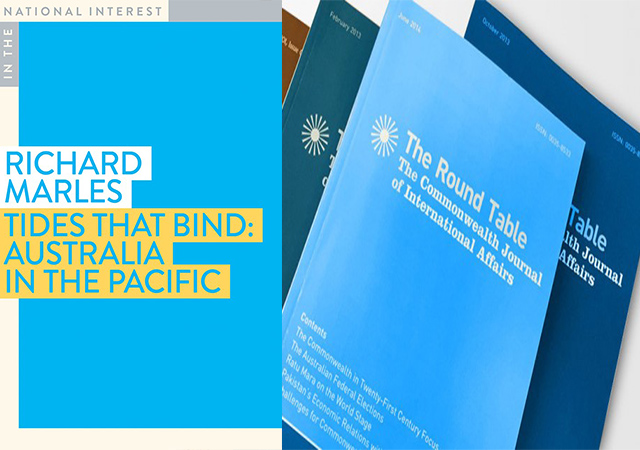
[This is an excerpt from an article in The Round Table: The Commonwealth Journal of International Affairs.]
This short book is part of the ‘In the National Interest’ series commissioned by Monash University Publishing; the series deals with a range of issues in contemporary Australian politics and public policy. In this case the value of the book is that it provides an insight into how a Labor government might approach the Pacific islands region; a federal election is due in Australia by May 2022. Should Labor become the next federal government, Richard Marles will be a major figure. He is aligned with the Labor Right and currently serves as deputy leader of the federal parliamentary Labor Party. As far as his Pacific experience is concerned, he was parliamentary secretary for Pacific island affairs (and also parliamentary secretary for foreign affairs) during the period of the Gillard Labor government, 2010–2013). Marles also led a programme to promote cooperation between the union movements in Australia and Papua New Guinea when he was assistant secretary of the Australian Council of Trade Unions.
This is a very readable book. Marles recounts various of his experiences in the Pacific, going right back to a school trip with Geelong Grammar School (Australia’s Eton; Marles’s father had been a teacher at the school). He sometimes describes the Pacific cultures as ‘exotic’, not meaning to exalt these cultures but rather emphasising differences with his Australian environment. The recounting of some of his Pacific experiences provides glimpses into the context Marles is focusing on. His argument essentially is that the Pacific islands region faces big challenges, and that Australia needs to do better in terms of its engagement with the region.
The major challenge is the failure of the Pacific island countries (PICs) to reach targets set under the Millennium Development Goals (MDGs) (since the MDGs concluded in 2015, why is there no reference to the subsequent Sustainable Development Goals (SDGs)?). Marles highlights the difficulties facing small island states in geographically remote locations (p. 32).
Marles recognises that Australia has an extensive diplomatic network in the Pacific, and also does well in terms of its aid commitment (reductions in overall aid from 2013–2014 now being reversed). He regards the treatment of the Pacific in the 2017 Foreign Policy White Paper as inadequate, arguing that ‘our motivations must be centred not only on our own fortunes but also on those of the people of the Pacific’ (p. 46). There is little reference to the Pacific ‘step up’ as announced by Prime Minister Scott Morrison in November 2018 (building on earlier initiatives); this has included the development of a ‘whole of government’ approach centred on an Office of the Pacific in the Department of Foreign Affairs and Trade. Marles argues for ‘a national revival of Pacific interest’ led by the Australian government (p. 44). But how is this to be achieved?
As far as Australian government policy is concerned, Marles focuses on four main areas: climate change; defence cooperation; ways of accessing the Australian economy; and development assistance (judged as ‘highly effective’ (p. 69)). Climate change policy under a Labor government is likely to be closer to what the PICs would like, but there are significant conflicts within Labor over this issue. On defence cooperation, Marles refers approvingly to the experience with RAMSI (Regional Assistance Mission to Solomon Islands, 2003–2017), but argues more generally for a ‘more militarily capable Pacific’ (p. 65) (how wise is this, given Fiji’s experiences with military coups?). In relation to the issue of accessing the Australian economy, Marles strongly supports the Seasonal Worker Programme, but there is no mention of PACER Plus (the Pacific Agreement on Closer Economic Relations Plus, entering into force in 2020). He sees scope for greater Australian involvement in service delivery, going beyond the normal parameters of foreign aid (p. 54). The experience with COVID-19 has highlighted the need for a more comprehensive approach to health (pp. 72–74). At a different level again, Marles sees possibilities for using a mutual love of sport (in this case, rugby league) to promote the participation of Papua New Guinea in Australia’s National Rugby League (pp. 70–71).
While Marles says that Australian policy should take account of views in the PICs, he could elaborate more on the way in which the PICs engage with the various issues themselves, including both regionally and on the global stage. What does he see as the role of the Pacific Islands Forum (briefly mentioned) and other regional groupings? (Incidentally, Tokelau, a dependent territory of New Zealand, is not a member of the Forum (p. 40).)
Marles’s discussion of the international context of Australian engagement is illuminating. He points out that Australia is and will be judged by the rest of the world if the Pacific islands region fares badly.
Derek McDougall is with the School of Social and Political Sciences, University of Melbourne, Melbourne, Australia.
Tides That Bind by Richard Marles, Clayton, Vic., Monash University Publishing, 2021, In the National Interest series.



